Summer Fields School
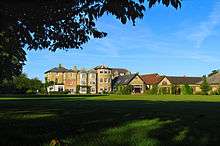 The school from its playing fields | |
| Motto | Mens Sana in Corpore Sano |
|---|---|
| Established | 1864 |
| Type |
Independent preparatory school Boarding school |
| Headmaster | David Faber MA (Balliol College, University of Oxford) |
| Deputy Headmaster | Matthew Faulkner MA (St. Peter's College, Oxford), PGCE |
| Chairman of the Governors | A.E. Reeks, MA, FRSA |
| Founder | Archibald Maclaren |
| Location |
Mayfield Road Oxford OX2 7EN England |
| Gender | Boys |
| Ages | 7–13 |
| Houses | Case, Congreve, Maclaren, Moseley |
| Former pupils | Old Summerfieldians |
| Website | Summer Fields School |
Summer Fields is a boys' independent day and boarding preparatory school in Summertown, Oxford. It was originally called Summerfield and used to have a subsidiary school Summerfields, St Leonards-on-Sea (known as "Summers mi").
History
Originally called Summerfield, it became a boys' preparatory school in 1864 with seven pupils. Its owner, Archibald Maclaren, had been educated at Dollar Academy and was a fencing teacher who ran a gymnasium in Oxford. He strongly believed in the importance of physical fitness. His wife, Gertrude, was a classical scholar and teacher, a daughter of David Alphonso Talboys.[1] The school motto is Mens sana in corpore sano: "A healthy mind in a healthy body".
The school grew and needed more staff, two of whom married into the Maclaren family: the Reverend Dr Charles Williams ("Doctor"), who took over the scholarship form from Mrs Maclaren, and married Mabel Maclaren in 1879, and the Reverend Hugh Alington married Margaret Maclaren in 1885 and took over the boys' games. The school remained in the hands of the Maclaren, Williams and Alington families for its first 75 years.
At the end of the 19th Century, "Doctor" became headmaster and there was much building at the school. A second school "Summers mi" was opened at St Leonards-on-Sea, Sussex, for boys to benefit from the sea air. In 1918 Doctor passed the headmastership to Hugh Alington. There was a lean spell in the 1930s and numbers fell, but John Evans and Geoffrey Bolton ("G.B.") took over in 1939. During World War II three other schools were evacuated to Summer Fields - Famborough School, Hampshire, Summers mi, and St Cyprian's School from Eastbourne - and this restored the numbers.
In 1955, the school became a charitable trust with a board of governors, including Harold Macmillan, who had been at the school as a boy and was soon to become Prime Minister.
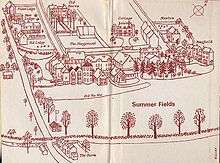
During the 1960s Pat Savage was headmaster, with the assistance of Jimmy Bell and Pat Marston. By the centenary in 1964, the school's appearance had changed relatively little (see illustration), but was thriving and energetic enough to celebrate with a hardback book of 332 pages, with contributions from "O.S." (old Summerfieldians) including stories about Archibald Wavell, 1st Earl Wavell and Harold Macmillan, and a friendly greeting in verse from arch-rival Horris Hill School.[2] One O.S. recollected:[2]:309
Then I met the Ogre [Pat Marston]. For my first few weeks I was terrified by this "monster". His appearance was formidable. He growled and shook the room as he entered. But once I learnt that he didn't actually eat little boys, even on Black Fridays,[note 1] the classes became amusing, exhilarating and even relaxing.
In 1975, Nigel Talbot Rice took over as headmaster. He put the school on a sound financial footing through a series of appeals which financed an ambitious building programme: new classrooms, the Macmillan Hall and Music Centre, an indoor swimming-pool, the Wavell Arts and Technology Centre (named after the 1st Earl Wavell), and the Sports Hall. In 1997, Talbot Rice retired and was succeeded by Robin Badham-Thornhill. In 2010 David Faber, an old boy and governor, took over as headmaster.
In 2002 a new lodge called "Savage's" was built. In recent years a new year group was added at the bottom of the school.
Summer Fields today
The boys are organised into four "leagues". One of them is named Maclaren after the Founder; the others are Moseley (after Henry Moseley), Congreve (after William La Touche Congreve), and Case (after William Sterndale Case, master from 1910 to 1922). Each league has its own identifying colour: Case red, Congreve yellow, Maclaren green, and Moseley blue. In their leagues the boys wear a polo shirt in the league colour, along with the rest of the uniform, blue corduroys, and brown shoes. On Sundays as well as on special days, such as the school concert, and the end of term, boys wear a tweed jacket, with a light blue coloured shirt, black shoes, and grey flannel trousers. Their ties are in their league colours.
The school has traditionally been a rival of the Dragon School, which is also in north Oxford.
Notable Old Summerfieldians
- See also Category:People educated at Summer Fields School
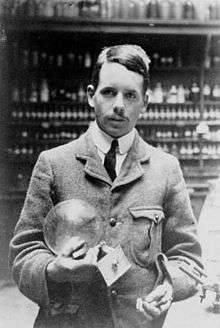

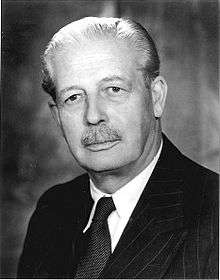

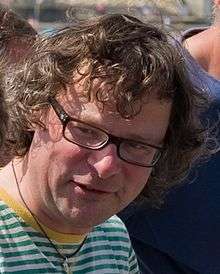
- Gubby Allen (1902–1989), cricketer
- Julian Amery (1919–1996), politician
- Anthony Asquith (1902–1968), film director
- Cyril Asquith, Baron Asquith of Bishopstone (1890–1954), judge
- General Sir Evelyn Barker (1894–1983)
- Ronald Barnes, 3rd Baron Gorell (1884–1963), author and politician
- Prince Hassan bin Talal (1947–), the former crown prince of Jordan
- Tom Parker Bowles (1974-), writer
- Sir Edmund Brocklebank (1882–1949), politician
- Harold Caccia (1905–1990), diplomat
- Sir Olaf Caroe (1892–1981), colonial administrator
- Lawrence Clarke (1990- ) Olympic sprint hurdler. Came 4th in the Olympic 110m Hurdles, London 2012.
- Sir Gerard Clauson(1891–1974), civil servant and linguist
- Edward Colebrooke, 1st Baron Colebrooke (1861–1939), politician
- Thomas Riversdale Colyer-Fergusson VC (1896–1917)
- William La Touche Congreve VC, DSO, MC (1891–1916)
- Clive Forster Cooper (1880–1947), paleontologist
- John Fremantle, 5th Baron Cottesloe (born 1927)
- George Courthope, 1st Baron Courthope (1877–1955), politician
- Harry Crookshank, 1st Viscount Crookshank (1893–1961), politician
- Hugh Dalton, (1887–1962), politician
- David Faber, schoolmaster and author, formerly politician[3]
- Hugh Fearnley-Whittingstall, chef and food writer[4]
- Dick Francis, jockey and novelist
- David Freeman-Mitford, 2nd Baron Redesdale (1878–1958), landowner and father of the Mitford sisters
- Sir Selwyn Fremantle (1869–1942), colonial administrator
- Sir Fergus Graham, 5th Baronet (1893–1978), politician
- Julian Grenfell (1888–1915), poet
- Edward Grigg, 1st Baron Altrincham (1879–1955), colonial administrator
- Air Marshal Sir Reginald Harland (1920-)
- John G.W. Husted Jr.
- Field Marshal Lord Inge, Chief of the General Staff
- David James (1919-1986), explorer, author, MP
- Homi Kharas (1954- ), economist
- Ronald Knox (1888–1957), theologian and writer
- Geoffrey Lawrence, 1st Baron Oaksey (1880–1971), Nuremberg trial judge
- Sir Christopher Lee (1922–2015), actor
- Patrick Macnee, actor
- Colin Hercules Mackenzie (1898–1986), spymaster
- Sir Geoffrey Mander (1882–1962), industrialist and Liberal politician
- Harold Macmillan (1894–1986), Prime Minister
- Henry Gwyn Jeffreys Moseley, physicist
- Sir Charles Montgomery (1876–1942), civil servant and diplomat
- Sir Roger Mynors, Classical scholar (1903–1989)
- Adam Nicolson[5] (1957- ) writer
- Sir Bernard Paget (1887–1961), General
- Robert Parker, Baron Parker of Waddington (1857–1918), judge
- Sir William Edward Parry (1893–1972), Admiral
- Victor Pasmore (1908–1998), artist and architect
- Julian Perkins, musician
- Geoffrey Peto (1878–1956), conservative politician
- Sir James Pitman (1901–1985), publisher
- John Redcliffe-Maud, Baron Redcliffe-Maud (1906–1982), civil servant and diplomat
- Arthur Rhys Davids DSO, MC with Bar, flying ace, (1909–1911)
- Sir Steven Runciman (1903-2000), historian
- Gavin Simonds, 1st Viscount Simonds (1881–1971), judge
- Edward Strachey, 1st Baron Strachie (1858–1936), Liberal politician
- George Sutherland-Leveson-Gower, 5th Duke of Sutherland (1888–1963), Conservative politician
- Sir Bertine Sutton (1886–1946), Air Marshal
- Frank Turner (1981-), musician
- Henry Usborne (1909–1996), Labour politician
- Archibald Wavell, 1st Earl Wavell (1883–1950), Commander of Imperial and Allied land forces in the Near East during World War II, penultimate Viceroy of India. The Summer Fields magazine once recorded that "Wavell mi. has done well in Africa".[6]
- Sir Hubert Winthrop Young (1885–1950), soldier and diplomat
Notes
- ↑ Pat Marston had the habit of putting up a sign indicating his mood on his days on duty.
References
- ↑ McIntosh, Peter C. "MacLaren, Archibald". Oxford Dictionary of National Biography (online ed.). Oxford University Press. doi:10.1093/ref:odnb/50298. (Subscription or UK public library membership required.)
- 1 2 Richard Usborne, 1964.
- ↑ 'Faber, David James Christian', in Who's Who 2010 (London: A. & C. Black, 2009)
- ↑ Fearnley-Whittingstall, Hugh. "It's yesterday once more". The Guardian. Retrieved 5 April 2015.
- ↑ Adam Nicolson. Prepared for Anything. The Times Magazine, June 25, 1994. pages 24-30.
- ↑ J.A.Gere and John Sparrow (ed.), Geoffrey Madan's Notebooks, Oxford University Press, 1981, at page 23
Sources
- Summerfields School Register 1864-1960, Oxonian Press 1960
- Richard Usborne (Editor), A Century of Summer Fields, Methuen, London, 1964
- Nicholas Aldridge, Time to spare?: A History of Summer Fields, 1989
External links
Coordinates: 51°46′41″N 1°15′47″W / 51.77806°N 1.26306°W